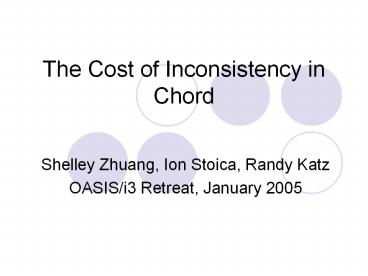The Cost of Inconsistency in Chord - PowerPoint PPT Presentation
1 / 22
Title:
The Cost of Inconsistency in Chord
Description:
Title: Snort - Lightweight Intrusion Detection for Networks Author: Sang YOUNG Last modified by: Shelley Zhuang Created Date: 8/29/2001 11:18:03 AM – PowerPoint PPT presentation
Number of Views:51
Avg rating:3.0/5.0
Title: The Cost of Inconsistency in Chord
1
The Cost of Inconsistency in Chord
- Shelley Zhuang, Ion Stoica, Randy Katz
- OASIS/i3 Retreat, January 2005
2
Introduction
- DHTs support a hashtable-like lookup interface
- Each node maintains a routing table about a few
other (typically O(log n)) nodes - A node communicates with other nodes to perform a
lookup - The routing state may become inconsistent as
nodes continuously join and leave - What is the impact of routing state
inconsistencies on lookup performance?
3
Outline
- Introduction
- Cost of Inconsistency
- Performance Evaluation
- Conclusion
4
Routing State Inconsistencies
Inconsistency Generated by Corrected by
False negative a node falsely thinks a neighbor is up Leaves Failure detection algorithms
False positive a node falsely removes a neighbor that is up Failure detection algorithms Failure recovery algorithms
Join hole a new node joins but has not been fully incorporated into the routing state Joins Join algorithms
Leave recovery a node leaves and disrupts the routing state Leaves Failure recovery algorithms
5
Possible Outcomes of a Lookup
6
Chord Protocol
- Each node has an identifier
- Nodes are ordered on a circular identifier space
- Key k is assigned to the first node whose
identifier is equal to or follows k on the
circular identifier space - Each node maintains a predecessor, successors,
and fingers - Correctness of lookup depends only on predecessor
and successor pointers
7
Cost of Inconsistency - Loss
- Network loss
- False negative a node forwards a lookup to a
neighbor that has failed
A
C
B
8
Cost of Inconsistency - Loop
- A forwards lookup to B, B forwards it on because
B's pred is between key and B
A
key
B
9
Cost of Inconsistency - Loop
- A forwards lookup to B, B forwards it on because
B's pred is between key and B
A
- A's succ is wrong, B's pred is correct or wrong
key
B
10
Cost of Inconsistency - Loop
- A forwards lookup to B, B forwards it on because
B's pred is between key and B
A
- A's succ is wrong, B's pred is correct or wrong
key
- A's correct succ should be some node between A
and key
B
? The above two cases can be caused by FP, join,
leave
11
Cost of Inconsistency - Loop
- A forwards lookup to B, B forwards it on because
B's pred is between key and B
A
- A's succ is wrong, B's pred is correct or wrong
key
- A's correct succ should be some node between A
and key
B
- A's correct succ should be some node between key
and B
? The above two cases can be caused by FP, join,
leave
- A's succ is correct, B's pred is wrong
12
Cost of Inconsistency - Incorrect
- A forwards lookup to B, B accepts it
- A's succ must be wrong because there is some node
between key and B - B's pred must be wrong because B only accepts a
lookup if its pred is before key, but there is a
node between key and B
A
key
Y
B
13
Cost of Inconsistency - Incorrect
- A forwards lookup to B, B accepts it
- A's succ must be wrong because there is some node
between key and B - B's pred must be wrong because B only accepts a
lookup if its pred is before key, but there is a
node between key and B
A
key
Y
B
- A's succ must be wrong, B's pred must be wrong
14
Cost of Inconsistency - Incorrect
- A forwards lookup to B, B accepts it
- A's succ must be wrong because there is some node
between key and B - B's pred must be wrong because B only accepts a
lookup if its pred is before key, but there is a
node between key and B
A
key
Y
B
- A's succ must be wrong, B's pred must be wrong
15
Cost of Inconsistency - Incorrect
- A forwards lookup to B, B accepts it
- A's succ must be wrong because there is some node
between key and B - B's pred must be wrong because B only accepts a
lookup if its pred is before key, but there is a
node between key and B
A
key
Y
B
- A's succ must be wrong, B's pred must be wrong
- A's correct succ should be some node between A
and key
? the above cases can be caused by FP, join, leave
16
Outline
- Introduction
- Cost of Inconsistency
- Performance Evaluation
- Conclusion
17
Lookup Timeouts vs. Network Loss Rate
18
Lookup Timeouts vs. Churn Rate
19
Incorrect Lookups vs. Churn Rate
20
Outline
- Introduction
- Cost of Inconsistency
- Performance Evaluation
- Conclusion
21
Conclusion
- Routing invariant has a first order impact on the
relative cost of different types of
inconsistencies - Cost of false negatives is higher than false
positives ? more important to ensure timely
failure detection than low probability of false
positive - Cost of join holes is higher than false positives
and leave recoveries due to the routing invariant
of Chord
22
Ongoing / Future Work
- Lookup losses
- Perhop retry
- End to end retry
- What is the best waypoint to try?
- Incorrect lookups
- Predecessor list
- Cost of inconsistency in other DHTs
- Correctness in Chord depends only on predecessor
and successor pointers - Many other protocols do not have similar entries
in the routing state that is sufficient for
correctness

